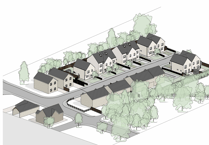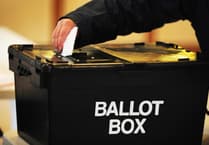“I’m too frightened to think where we will be in October when it comes to paying fuel bills.”
These are the sobering words of Meilyr Tomos who this week started work in his new role of Fuel Poverty Officer for Gwynedd Council. He previously worked for Y Dref Werdd, a social enterprise funded by the National Lottery is working hard to help people facing fuel poverty in the Vale of Ffestiniog. Y Dref Werdd’s projects include ways to save energy and money in the home, and with the fuel price hike in April, and another one on the way in October, they have, and expect to help, more people than ever before.
With people being moved from legacy benefits to universal credit, Meilyr has been crunching the numbers when it comes to paying the bills.“
A single person over 25 on universal credit will get about £77 a week. If you don’t have gas in Gwynedd, you probably have storage heaters and we’ve worked out that by October it will cost £37 a week to run just one of those. Fuel poverty in Wales is a real issue.”
He added: “Since the energy increase in April, Mrs Jones, for example, who used to put £20 on her electricity meter, is now having to put £50 on it instead.“
People can’t make massive savings by turning the heating off because the standard charge has more or less doubled and that’s the charge before you even start using any energy.
“Historically, there were pre payment tariffs dressed up as zero standing charge tariffs and they attracted a lot of customers. We’re coming across clients now who signed up for those and capped their supply, but when those small suppliers started to collapse, people were moved across to bigger energy suppliers who do have a standing charge, and this has led to people seeing their bills rise.
”To try to help more people in Blaenau Ffestiniog and the surrounding area, Y Dref Werdd has set up a community fridge.
“We collect 80 kilos of produce a week from Bangor and distribute it via our community fridge,” Meilyr explained.“We are also in the process of setting up an emergency fuel bank (a supply of logs) to cater for people in the area. Scaling that up is proving difficult but we are working on it.”
Meilyr has helped many people in Blaenau and in his new role as Fuel Poverty Officer for Gwynedd, he hopes to be able to help many more, but he is concerned about the future.
“The size of what is facing is so great that although our usual advice about switching off lights and using a slow cooker instead of the oven is stillhelpful, it’s not going to be enough.“
I would encourage people from Gwynedd, Ceredigion and Powys to find out what they might be entitled to, to help pay their bills. At Y Dref Werdd we have been assisting people with numerous applications, and we’re looking for new ways to help people all the time. There are schemes out there that we, and other organisations such as Citizens Advice, as well as local authorities, can point people to. Please, if you are worried, contact your local authority and find out how they can help.
There is a pot of money that they, and businesses, can draw from to make people’s homes more energy efficient.“And people who rent privately should know that landlords have to make sure properties do not fall below the Energy Performance Certificate level.”
Oil heated houses are tricky, Meilyr admits.
“Oil, LPG and solid fuel are all unregulated and at the whim of the market,” he said.
Ofgem can control anything that comes down a pipe or a line, so gas and electricity, but not oil.”With so much fuel being generated locally, Meilyr is frustrated by the fuel price hikes.
“There’s enough embedded hydro in South Gwynedd to produce our own energy, and if we had control of it we wouldn’t have this problem.
“We need de-regulation of the market to use the energy we are producing right here, so we’re not constantly at the whim of global pressures.
“We shouldn’t accept this. We already produce what we need here in South Gwynedd. It is ironic that we are one of the worst areas for fuel poverty.”



.jpeg?width=209&height=140&crop=209:145,smart&quality=75)

Comments
This article has no comments yet. Be the first to leave a comment.